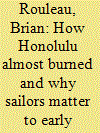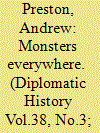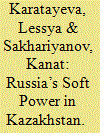| Srl | Item |
| 1 |
ID:
132026


|
|
|
|
|
| Publication |
2014.
|
| Summary/Abstract |
This article argues that in ignoring the exploits of American sailors overseas, diplomatic historians have missed a very important facet of the early republic's foreign relations. It claims that 1898 did not represent any decisive turn to the international, but rather, a moment in which primary control over the nation's foreign relations shifted from maritime nonstate actors to the state itself. To make this case, the essay discusses the form and substance of violent altercations between American seafarers and those they encountered abroad. It reads barroom brawling and harborside tumult as "diplomatic fisticuffs," that is, as sites for the enactment of a distinct, working-class and masculine foreign relations agenda. Politicians, diplomats, and missionaries, however, saw the mighty influence seafaring men exerted overseas as deeply problematic. But even as the American state worked to control rambunctious sailors, late nineteenth-century policy makers discovered that appropriating the violent words and deeds of the nation's nautical class could prove useful in justifying imperial adventure abroad. Thus even as the nation's mariners receded from view overseas, they continued to influence events around the globe.
|
|
|
|
|
|
|
|
|
|
|
|
|
|
|
|
| 2 |
ID:
132025


|
|
|
|
|
| Publication |
2014.
|
| Summary/Abstract |
This article, based on the 2014 Stuart L. Bernath Lecture, traces the emergence of "national security" as a foreign policy doctrine that came to define the safety of the United States in extremely broad terms, both geographically and ideologically. Doing so reveals that "national security" has its own history. The concept was invented by fusing long-standing, traditional concerns about U.S. territorial sovereignty with a newer, thoroughly revolutionary desire to protect and promote America's core values on a global scale. Franklin D. Roosevelt's legacy looms large in the history of American foreign relations, but it was his use of fear to invent the modern doctrine of national security that is possibly its most consequential aspect. After a couple of false starts, a fusion of geographical and ideological security took place during the world crisis of the late 1930s and the world war that followed. The results have defined U.S. foreign policy ever since.
|
|
|
|
|
|
|
|
|
|
|
|
|
|
|
|
| 3 |
ID:
098120


|
|
|
|
|
| Publication |
2010.
|
| Summary/Abstract |
The author examines the tenets of official PRC doctrine regarding the issues of nuclear weapons proliferation. An attempt is made to analyze contemporary China's understanding of the heart of this issue in the context of ensuring national geostrategic interests. The precepts of PRC foreign policy with respect to the role and place of nuclear non-proliferation and nuclear deterrence in the system of international security are described. China's political steps in regard to the nuclear issue on the Korean Peninsula are analyzed to examine the question of the practical application of its doctrinal tenets.
|
|
|
|
|
|
|
|
|
|
|
|
|
|
|
|
| 4 |
ID:
150545


|
|
|
|
|
| Summary/Abstract |
The globalization promoting the growth of interdependence of states that makes relying on the “hard power” increasingly ineffective. Due to increase in competition for the spheres of influence and the capacity to involve individual states and regions in the sphere of one’s economic and political interests is still on the agenda. In this context, the concept of “soft power” has been becoming increasingly popular.
|
|
|
|
|
|
|
|
|
|
|
|
|
|
|
|